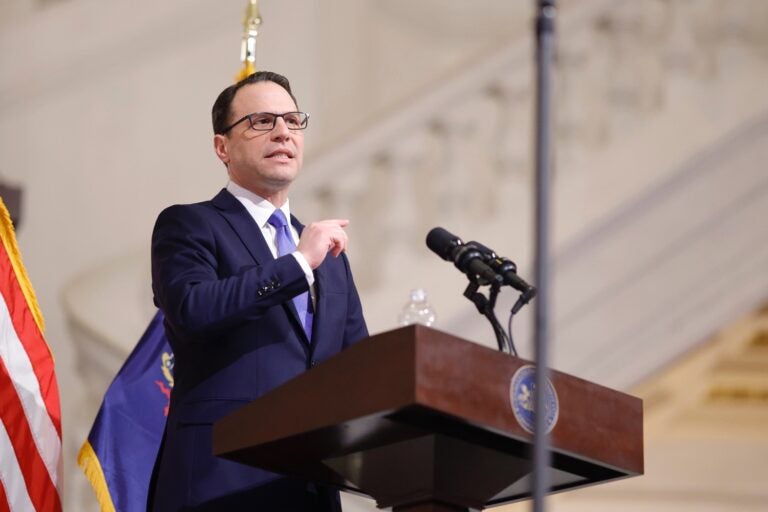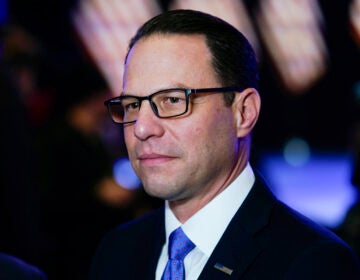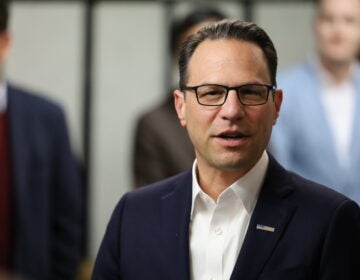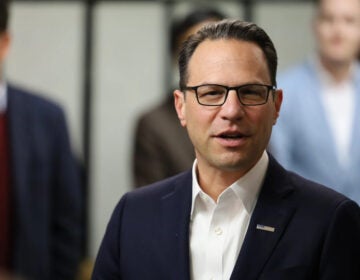Who is Pennsylvania Gov. Josh Shapiro? Full biography, key accomplishments, controversies and more
Shapiro has emerged as a top contender for the vice-presidential nod following President Joe Biden’s exit from the race. Learn more about his long political history.

Pennsylvania Governor Josh Shapiro (Commonwealth Media Services)
This story originally appeared on Spotlight PA.
Pennsylvania Gov. Josh Shapiro has emerged as a top contender for the vice-presidential nod following President Joe Biden’s stunning announcement that he is dropping out of the 2024 race and endorsing Kamala Harris to take his spot on the ballot.
Shapiro, 51, was elected Pennsylvania’s governor in 2022 and assumed office in January 2023. He is a moderate Democrat whose career trajectory has seen him move from congressional aide to Pennsylvania’s chief executive, all within two decades.
Already, top elected Democrats in Pennsylvania like state House Speaker Joanna McClinton and party leaders like Philadelphia Democratic chair Bob Brady have endorsed Shapiro as a possible vice presidential pick, citing his wins in a divided General Assembly and electoral success in a key swing state.
Shapiro, so far, has stayed silent on whether he’s discussed a potential nomination with state and national Democrats. A spokesperson declined to comment to Spotlight PA about the speculation.
The governor is scheduled to make a public appearance Monday afternoon in Pittsburgh, where he is sure to face a barrage of questions regarding his plans.
If Shapiro were to be tapped as a vice presidential candidate, he would be able to campaign while simultaneously serving as governor.
Who is Josh Shapiro?
The son of a pediatrician and educator who grew up in Philadelphia’s suburbs, Shapiro initially planned to follow in his father’s footsteps and become a doctor. But a few months into his freshman year at Rochester University, he nearly flunked his organic chemistry class. Around the same time, his dream of playing college basketball was shattered when he was cut from the university’s basketball team.
A knock on his dorm room door not long after would end up launching his career in public service, and later, politics: It was a fellow student, asking him if he would run for student government. He did — and won.
He hasn’t lost a bid for public office since.
In his 20s, he worked as a congressional aide on Capitol Hill while also getting his law degree at Georgetown University in Washington, D.C.
In 2004, he ran for a seat representing Montgomery County in Pennsylvania’s House of Representatives. He won, and remained in the state House for four two-year terms, during which he came to be known as a policy wonk and, later, a strategist who helped Democrats cement a razor-thin voting advantage in the chamber.
His first statewide run for office came in 2016 when he launched his successful campaign to helm the Pennsylvania Office of Attorney General, which had just come off four tumultuous and scandal-plagued years under Democratic predecessor Kathleen Kane.
He ran for governor in 2022 against a Trump-endorsed candidate, state Sen. Doug Mastriano (R., Franklin). Shapiro cast the race as a referendum on preserving democracy and constitutionally protected freedoms, including the right to abortion.
Again, Shapiro handily won the election and, in the process, shattered records for the most money ever spent on a governor’s race in Pennsylvania.
Shapiro, an observant Conservative Jew, has frequently said that his faith played prominently into his decision to enter public service.
What are Josh Shapiro’s key achievements?
Many of Shapiro’s key achievements came while he was Pennsylvania’s attorney general.
His office investigated the role of pharmaceutical manufacturers and distributors in the nation’s opioid crisis, and prosecuted natural gas companies.
But his legacy there was irrevocably shaped by his office’s scathing grand jury report on child sexual abuse and its coverup in nearly every Roman Catholic diocese in Pennsylvania. The investigation — which Kane, his predecessor, had initiated — sparked similar inquiries across the nation and landed Shapiro on television screens across the globe.
As attorney general, Shapiro positioned himself as a foil to the values and policies of Trump and his administration.
He joined other Democratic attorneys general in suing the administration over its family-separation policy for migrants on the U.S.-Mexico border; and over a rule that would have allowed employers more leeway in denying birth control coverage mandates under the Affordable Care Act.
Shapiro’s office was also the one in court defending Pennsylvania’s election results, which came under attack by Trump and his surrogates in the weeks after Trump’s loss to Biden in the 2020 election.
Less than two weeks after Shapiro took office as governor, he had to contend with a crisis when a train derailed in East Palestine, Ohio, less than a mile from Pennsylvania’s border, and released thousands of tons of toxic chemicals.
Then, amid state budget talks, an overpass on I-95 suddenly collapsed after a truck fire. The bridge was used by tens of thousands of Philadelphia commuters every day, and its failure required Shapiro to coordinate a temporary replacement in less than two weeks while under national scrutiny.
The speed with which the highway was rebuilt, and Shapiro’s visibility during the project — hovering over the collapse in a helicopter, setting up a construction live stream, holding enthusiastic media briefings — won him national attention.
As governor, Shapiro has negotiated two budgets with Pennsylvania’s divided state legislature — the only in the country — that dramatically increased funding for public education.
Budget negotiations during his first year in office were temporarily delayed after a politically embarrassing incident. As the June 30 deadline neared, the governor, according to multiple accounts, privately negotiated a deal with state Senate Republicans to create a taxpayer-funded school voucher plan. Democrats privately said they were blindsided by the move and refused to give their support to the proposal.
Despite Shapiro’s efforts to assuage members of his party, the governor was forced to abandon the plan.
Shapiro scored a major win in this year’s budget, securing $500 million for a program to prepare sites for industrial or mixed-use developments. Still, the final deal did not include several other key issues Shapiro advocated for, including sustainable funding for public transit and the legalization of adult-use recreational marijuana.
“There were some things we didn’t get done this time,” Shapiro acknowledged during a news conference after signing the budget, “but in a productive democracy, this is how progress is made — by moving past partisan politics and having real conversations together.”
Has Josh Shapiro been involved in any controversies?
One of the few controversies of Shapiro’s tenure as governor came courtesy of one of his oldest allies, his now-former legislative liaison Mike Vereb.
Shapiro and Vereb, a Republican, are both from Montgomery County and served together in the state House. When Shapiro became attorney general, he brought Vereb on as a top advisor. And when Shapiro was elected governor, Vereb was one of the few Republicans to join his staff, this time in a key role as the governor’s emissary to the legislature.
But in September, Vereb resigned. His departure came shortly after reporters had learned a staffer had filed a complaint against him alleging harassment that had begun shortly after the start of the administration.
Spotlight PA learned that the administration had quietly paid out $295,000 to settle the complaint three weeks before Vereb’s abrupt resignation. Shapiro would not discuss the matter in any detail, with his administration saying only that it handled the matter in a professional and timely manner.
That settlement isn’t the only matter about which Shapiro has been notably tight-lipped. Across the board, Shapiro’s administration has been markedly more opaque than previous governors’.
As Shapiro prepared to take office, he had members of his transition team sign nondisclosure agreements and would not say who paid for inauguration events.
Unlike his predecessor, who released detailed daily schedules, Shapiro has declined to regularly release information about who he meets with behind the scenes. He also categorizes his daily calendars as “personal” papers, which exempts them from the state’s Right-To-Know Law.
The governor also loosened a notoriously tight gift ban for his employees while arguing it would still protect against gifts from lobbyists influencing his agenda.
However, Shapiro has still accepted free tickets, including to the Super Bowl, paid for by unknown donors to a little-known fund managed by Team PA, a Harrisburg-based nonprofit of which the governor is a co-chair.
He also listed tickets to sporting events, from long-time donors and lobbyists, as campaign contributions.
The administration has argued this is all in compliance with the state’s ethics and campaign finance laws, which are among the most lax in the country, and that the gift ban doesn’t apply to Team PA.
Shapiro, one of the country’s most prominent Jewish politicians, has also taken a central role in condemning antisemitism and what he sees as weak responses to it in the wake of Hamas’ Oct. 7 attack on Israel, which killed 1,200 people.
“I am pro-the idea of a Jewish homeland, a Jewish state, and I will certainly do everything in my power to ensure that Israel is strong and Israel is fortified and will exist for generations,” Shapiro told the New York Times.
As protests against Israel’s war in Gaza — where the death toll now tops 39,000 — have escalated, Shapiro has argued some demonstrations have crossed a line into bigotry.
Amid rising protests against the war, the Shapiro administration updated the office’s code of conduct to bar “scandalous” conduct. An email accompanying the policy cited social media posts, boycotts, graffiti, and public confrontations as examples of potential “hate speech” that would not be tolerated.
He also backed a bipartisan bill that would strip state funding from any school that divests from Israel.
What’s next for Josh Shapiro?
Before Biden announced he was stepping down, Shapiro, who has made many appearances as a surrogate for and supporter of Biden, said he stood by the president.
Soon after Biden announced he would not accept the nomination for reelection and endorsed Vice President Kamala Harris as his successor, Shapiro issued a statement giving her his full support.
“I’ve known Kamala Harris for nearly two decades — we’ve both been prosecutors, we’ve both stood up for the rule of law, we’ve both fought for the people and delivered results,” Shapiro said in a statement released by his campaign office.
“Kamala Harris is a patriot worthy of our support and she will continue the work of generations of Americans who came before us to perfect our union, protect our democracy, and advance real freedom. She has served the country honorably as Vice President and she is ready to be President.”
As of Monday morning, Shapiro was scheduled to appear at an afternoon news conference in Pittsburgh to announce the recipients of federal pollution reduction grants.

Get daily updates from WHYY News!
WHYY is your source for fact-based, in-depth journalism and information. As a nonprofit organization, we rely on financial support from readers like you. Please give today.





